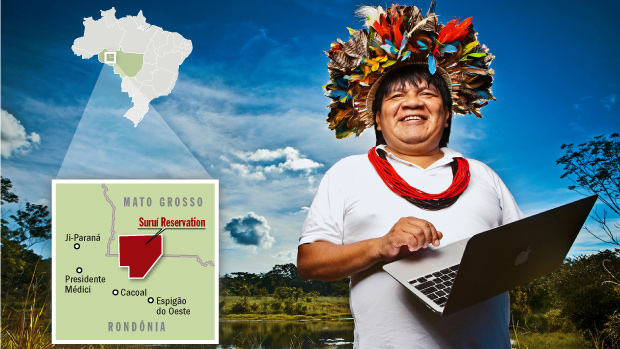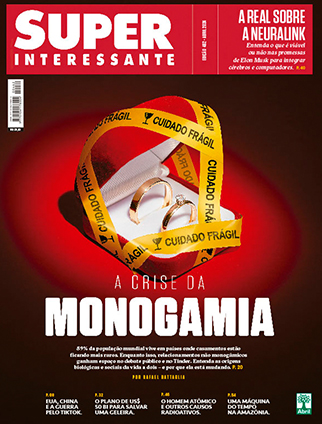“My weapon is the computer”
More famous abroad than in Brazil, chief Almir Suruí proves that Indigenous culture and modernity are compatible


VEJA Rio+20 Special Issue (VEJA)
» Learn how to download the complete edition here
Among his countrymen, Almir Narayamoga Suruí is respected as a skillful hunter. However, the supreme leader of the suruís-paiteres, who lived in the forest up to the age of 12, with very rare contacts with the urban man, and did not speak Portuguese, says he has put his bow and his arrows aside. “Today, my weapon is my computer”, states the chief, or labway esage, in the tupi-mondé language. “I am a fan of technology. I know the power it holds.” At the age of 37, with an unfinished university course in applied biology and another in progress in environmental management, Almir is a veteran of the modern tools of communication. In 2007, he called the world’s attention on seeking, and closing, a partnership with Google to monitor the deforestation in the Indigenous land of Sete de Setembro, on the border between Rondônia and Mato Grosso. Today, he spends more time in the city of Riozinho, Cacoal district, in Rondônia, than in the village. He travels two to three times almost each month abroad to give lectures. He has become a coveted celebrity, he is not the folkloric Indian linked to the image of exploitation we have of an Indian. “My salary is still smaller than that of former presidents of the Republic”, he answers the question about his personal finances, also showing his mastery of irony.

Almir will be one of the highlights of Rio+20. He will be giving eight lectures (one together with the Google team) and will take part in five discussion panels. Why are so many people interested in hearing him? It is not just because of the pleasant good-natured air and the curious slightly wavering Portuguese. Almir proposes an unprecedented path for Indigenes and other traditional groups from the forests of Brazil and worldwide. A path that does not allow paternalism and the paralyzing custody of the state. Despite having lived up to 1969 isolated from non-Indians, with neither clothes nor written words, the suruís are presenting a sustainable development plan of fifty years perfectly adapted to the economic logic of a responsible capitalism, the so-called green economy. “Our culture will change whichever way”, says Almir. “There is no way of isolating oneself from the world, this is why we decided where we want to go.” The condition: integration with the world tuned to the advancements and ubiquity of the internet, points out Almir, does not mean giving up the choice to live in the land of one’s parents and grandparents. The suruís made the clear option to live in the forest and from the forest – and to link this decision to another innovation. One of the central points of the project is the sale of carbon credits through a mechanism of financial reward for non-deforestation known as Redd.
“Brazil needs an economic solution that guarantees maintenance of the forest”, says Paulo Moutinho, director of Ipam, a reputable Amazonian research institute. “Management and extraction are local solutions, of small scale. Redd brings value to the forest in great dimensions.” Up until today, the Brazilian government has released only one Redd initiative, the Juma Project, prepared by a local foundation in the region of Novo Aripuanã municipality, on the margin of BR-319 highway. The initiative by Almir’s group should become, soon, the second to be authenticated – hence its international relevance.
Dealing with carbon credits, due to being something new, is still noisy and full of traps – it depends, for starters, on the green light of the ever slow hand of the state. In March, the operation (up until then discrete) of an Irish company was discovered. Celestial Green bought for 120 million dollars the right to exploit for thirty years the carbon credits of the mundurucu people, in Pará. A detail: the Indians would be prevented from hunting, fishing or farming in their lands. Funai quickly declared the illegality of the initiative. “The contract was signed by a handful of leaders, without consulting the people”, says Jairo Mundurucu, current director of Associação Pussuru, entity that represents the mundurucu Indians. Jairo was elected after the former management fell due to the scandal. “There are many people making projects on their own”, says Nanci Maria Rodrigues da Silva, Rondônia state secretary for environmental development.
Greenbacks in exchange for the green
How does Redd work – the financial mechanism that rewards those who keep the forest standing

Almir’s suruís took the care, and were smart enough, to do everything according to the manual. Actually, they are preparing the land for when the sale of Redd bonds is regulated. They made a carbon stock inventory, created annual deforestation quotas for subsistence activities, foresaw a management of these areas, started a reforestation action and, with all this, obtained the international certifications. The money from Redd is crucial to maintain the forest. For the project’s success, it is fundamental to end the traffic of illegal wood. Nobody buys carbon credits that can literally turn into smoke. Knowing this, the suruís opened several fronts: they are investing in environmental tourism, they created the 100% Paiter brand (and logo) and negotiated the entry of their products in a large supermarket network. The resources from these activities are managed by a financial fund that is being set up in partnership with the Brazilian Biodiversity Fund – Funbio. “It is the assurance that the money will be used clearly and transparently”, says Ângelo Augusto dos Santos, of Funbio.
The suruís, more professionalized and much better guided than the caiapós, who became famous in the 80s on selling Brazil nut oil to the English network of stores The Body Shop, now boast of the success in a traditionally hostile environment. Up to the 90s, they were known as Indian loggers. Most of the breadwinners earned their living by overlooking the entry of the explorers. “Five years ago, 400 trucks of wood left Sete de Setembro daily”, says Almir.

Experience without nostalgia – José Suruí, 49 years old, member of the suruí elders’council, accompanied the first contact with the Brazilian society. He saw his fellowmen fall ill and die from measles and tuberculosis. From 5 000, 290 remained. He lost father, mother and four siblings. “The elders warned us not to get too close to the white men”, he recalls. “We did not believe, we were curious.” But all this is now past. A member of the so-called paiter parliament, he takes part actively in the construction of the current development plan (VEJA)
From the age of 17, already with the status of leader, he has requested the help of the Brazilian authorities against the loggers – the illegal predators, and not against those who perform their activities within the standards. Almir was said to have denounced people from his own group. “I did not denounce”, he says. “I was in a meeting with the Federal Police, complaining, and they told me: ‘But there are Indians involved’. I was nervous. I answered: ‘Then arrest them’.” Today, criminal extraction of wood in the lands of the suruís is rare. However, the pressure for increasingly vaster areas of extraction continues. Last month, after arresting three trucks transporting illegal wood, a suruí chief was the victim of an ambush. He was saved by a vehicle that was passing by, but he was entrusted with sending a message: “Tell Almir that we will get him and his family”.
Almir’s family, as it is formed, would not exist were the Indigenous daily life to be governed by the Brazilian Criminal Code. Since it is not, Almir has two wives (non-Indians) and five children. They all started to walk under police protection. “Nobody wants anything to happen to us now”, says Almir’s second wife, the historian Ivaneide Bandeira Cardozo. “But what about after Rio+20?”
https://www.youtube.com/watch?v=aaWWFxF-5ZM


 Shopping se manifesta sobre ‘calote’ de Taís Araújo
Shopping se manifesta sobre ‘calote’ de Taís Araújo Mais um dia na vida de Elon Musk: ações da Tesla caem, carros encalham
Mais um dia na vida de Elon Musk: ações da Tesla caem, carros encalham Ivanir dos Santos entra com representação contra Ludmilla: ‘É crime’
Ivanir dos Santos entra com representação contra Ludmilla: ‘É crime’ Eduardo Suplicy surpreende ao comparecer em aniversário de Mano Brown
Eduardo Suplicy surpreende ao comparecer em aniversário de Mano Brown A milionária conta dos carros blindados de Eduardo Paes no Rio
A milionária conta dos carros blindados de Eduardo Paes no Rio







